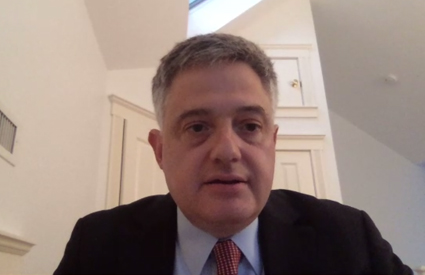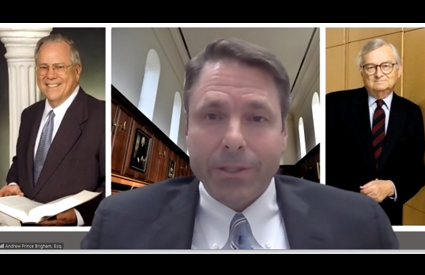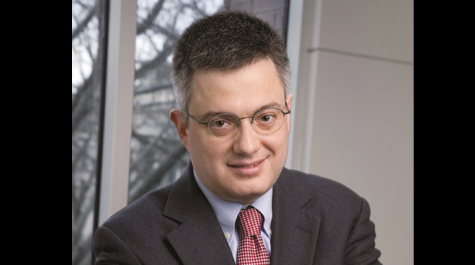Henry E. Smith Honored With Brigham-Kanner Property Rights Prize
As a longtime attendee of William & Mary Law School’s annual Brigham-Kanner Property Rights conference, Henry E. Smith of Harvard Law School considers the event “the high point of the year for people in the field of property.”
That point was raised a little higher for Professor Smith on Thursday, October 1, when he was awarded the 2020 Brigham-Kanner Prize for his outstanding work on property rights. Watch video.
The Brigham-Kanner Property Rights Prize is named in honor of the lifetime contributions of Toby Prince Brigham, founding partner of Brigham Moore, LLP, and Gideon Kanner, professor of law emeritus at Loyola Law School in Los Angeles. It is presented annually by William & Mary’s Property Rights Project to a scholar, practitioner or jurist whose work affirms the fundamental importance of property rights.
Although this year’s conference (the 17th such event) was held online due to the COVID-19 pandemic, the event drew many of the nation’s leading scholars and practitioners to celebrate Smith and engage in lively discussions of current property law issues. Attendance was strong, with 297 registrants following the panels from afar.
Smith is the Fessenden Professor of Law at Harvard Law School, directs the Project on the Foundations of Private Law, and is the Reporter of the Fourth Restatement of Property. His scholarship focuses primarily on the law and economics of property and intellectual property, and considers how property’s structure lowers information costs and constrains strategic behavior. He teaches primarily in areas related to property, remedies, equity, and law and economics.
Lynda Butler, Chancellor Professor of Law and Director of the Property Rights Project, praised Smith as “one of the deepest thinkers we have recognized” with the property rights prize. She also referred to Smith’s ability to innovate, introducing new methods and ideas about property that have led to the emergence of a theor y of property focusing on its architecture.
y of property focusing on its architecture.
“Whether it is his work on the relevance of an old doctrine, his explanation of the interface between contracts and property, his insights into well-managed semi-commons, or his work on two strategies for delineating the nature and scope of property rights, Henry continues to push the boundaries of property theory in ways that reveal its complexity,” Butler said.
Butler added that “few scholars could take a seemingly obsolete doctrine like numerus clausus and give it modern relevance. Very few can bring property from what critics predicted was its demise, its disintegration, to its reemergence as a powerful system. His analysis is complex; reading his work is not a leisurely walk in the park, but the lessons learned are so invigorating that the careful reader will inevitably have an ah-ha moment.”
Andrew Brigham, the managing partner and owner of the Brigham Property Rights Law Firm, PLLC, in Jacksonville, Florida, and a member of the Brigham-Kanner Conference Coordination Committee (and Toby Brigham’s son) painted the context for the prize that honors Smith. He stressed the importance of private property to protecting individual Liberty.
“The civil right of private ownership is a little piece of sovereignty that each and every one of us has,” Brigham said. “It really does make us more free, and I think the beauty of this program – and the vision and the genius of it – has been to…bring the academy together with the practicing bar and to hold the conference where we really are looking not just at property rights in terms of its theory, but property rights in terms of its application—and we have such a wonderful historic context to do so at the law school at William & Mary.”
one of us has,” Brigham said. “It really does make us more free, and I think the beauty of this program – and the vision and the genius of it – has been to…bring the academy together with the practicing bar and to hold the conference where we really are looking not just at property rights in terms of its theory, but property rights in terms of its application—and we have such a wonderful historic context to do so at the law school at William & Mary.”
The evening was the first property rights conference for A. Benjamin Spencer, who became Dean of William &Mary Law School on July 1. Spencer launched the event with welcoming remarks, and shared memories of working around the corner from Smith, when Spencer spent the 2019-20 academic year at Harvard Law. Spencer also had special words of praise for the conference’s founder, Joseph T. Waldo, J.D. ’78.
“It was actually Joe’s idea to create a program in property rights law at this law school, and it was Joe’s generosity that has enabled us to begin developing this concept,” Spencer said. “We’re all in your debt; I really thank you; this is a tremendous legacy.”
Spencer also praised Lynda Butler for her “tireless work” over the years, but especially now having to create an online event during the pandemic.
“She has labored long and hard to bring this conference to  fruition,” Spencer said. “I know it's a labor of love, it’s her passion that I really admire, so, thank you, Lynda, for your years of extraordinary dedication and service to this event.”
fruition,” Spencer said. “I know it's a labor of love, it’s her passion that I really admire, so, thank you, Lynda, for your years of extraordinary dedication and service to this event.”
Smith joins an esteemed list of Brigham-Kanner Property Rights Prize winners. Previous recipients include Frank I. Michelman (2004), Richard Epstein (2005), James W. Ely, Jr. (2006), Margaret Jane Radin (2007), Robert C. Ellickson (2008), Richard E. Pipes (2009), Carol Rose (2010), retired Supreme Court Justice Sandra Day O’Connor (2011), James E. Krier (2012), Thomas W. Merrill (2013), Michael M. Berger (2014), Joseph William Singer (2015), Hernando de Soto (2016), David L. Callies (2017), Stewart E. Sterk (2018), and Steven J. Eagle (2019).
“I am thrilled to be joining this group of property prize winners,” Smith said. “I looked over the list again today…. I think I could have actually recited them from memory, because they’re a really super group, and it’s really kind of hard to believe that I’m joining them, not just at a conference, but actually joining their ranks.”
About William & Mary Law School
Thomas Jefferson founded William & Mary Law School in 1779 to train leaders for the new nation. Now in its third century, America's oldest law school continues its historic mission of educating citizen lawyers who are prepared both to lead and to serve.
